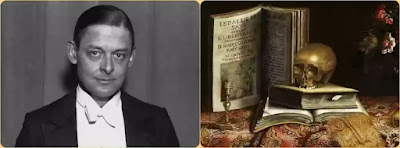Also Read
Whispers of Immortality
Webster was much possessed by death
And saw the skull beneath the skin;
And breastless creatures under ground
Leaned backward with a lipless grin.
Daffodil bulbs instead of balls
Stared from the sockets of the eyes!
He knew that thought clings round dead limbs
Tightening its lusts and luxuries.
Donne, I suppose, was such another
Who found no substitute for sense,
To seize and clutch and penetrate;
Expert beyond experience,
He knew the anguish of the marrow
The ague of the skeleton;
No contact possible to flesh
Allayed the fever of the bone.
. . . . .
Grishkin is nice: her Russian eye
Is underlined for emphasis;
Uncorseted, her friendly bust
Gives promise of pneumatic bliss.
The couched Brazilian jaguar
Compels the scampering marmoset
With subtle effluence of cat;
Grishkin has a maisonnette;
The sleek Brazilian jaguar
Does not in its arboreal gloom
Distil so rank a feline smell
As Grishkin in a drawing-room.
And even the Abstract Entities
Circumambulate her charm;
But our lot crawls between dry ribs
To keep our metaphysics warm.
Summary and Analysis
Introduction: Whispers of Immortality has a title which obviously plays on Wordworth's Intimations of Immortality from Recollections of Early Childhood. Another of the quatrain poems published in Poems 1920.
Summary: Webster and Donne knew thought embraces physical death while intensifying its lusts. Both knew that no fleshly contact could allay the fever of the bone; it burned for something beyond the flesh. They were concerned with matters of greater significance than with matters concerned with the flesh or sexual desire. The second part of the poem offers the contrast to the attitude of Webster and Donne. The moderns are much possessed by Grishkin. We are given a sensuous picture of a Russian woman, with emphasis on the physical attractions. She is no "breastless creatures," but gives promise of pneumatic bliss. Alien, overwhelming, animal and rank, the flesh now dominates man. Possessed by death, Donne and Webster saw beyond the flesh; possessed by flesh, modern men take refuge in abstractions to conceive of any life beyond the physical.
Grishkin sits in her drawing room waiting to catch her lover as the sleek jaguar awaits its victim in the forest. Grishkin's appeal is enormous, but it is foul. Modern man has to keep thought and sense separate: otherwise living sense would conquer his feeble metaphysics.
Critical Appreciation: Eliot obviously found the tension between sex and death in the work of the Jacobeans most significant and relevant to the modern situation. The modern attitude gives mere "whispers of immortality", for they are only the furtive rustling of dry bones without the anguish of marrow.
